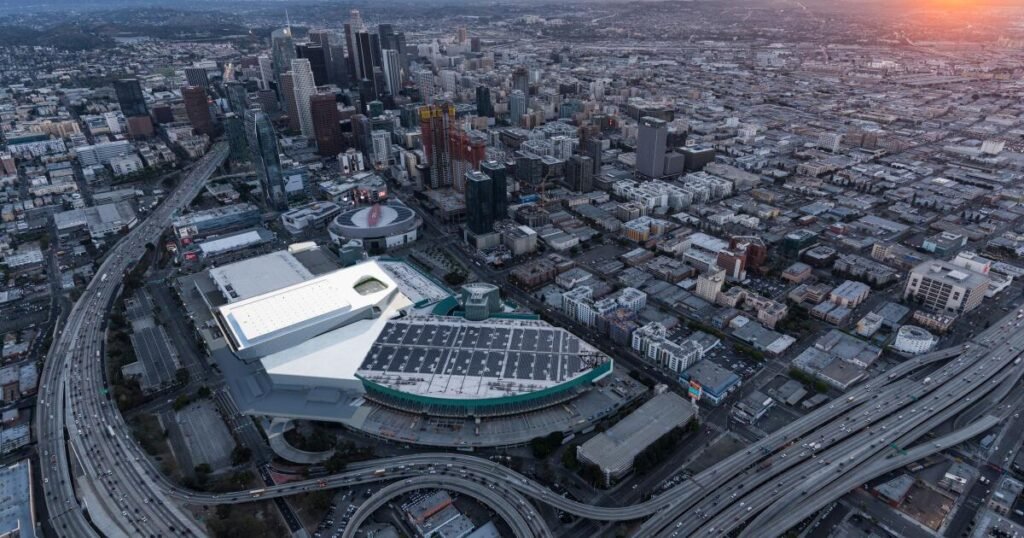Los Angeles city leaders had tried and failed for decades to come up with plans to expand the city's downtown convention center, a giant green building built in the 1970s adjacent to two freeways.
The City Council took a big step toward that transformation Tuesday, voting 13-1 to spend $54.4 million on preliminary design work as part of a plan to expand the center by 2028, when Southern California will host the Olympics.
The convention center doesn't need to be big enough to host Olympic sports like table tennis and fencing, but city leaders hope to use the international conference as a springboard to kick-start construction.
“This is an investment we need to make,” said City Councilwoman Tracy Park, who chairs the Olympic Planning and Tourism Committee. “And if we can do it now, that's what we should do.”
Including borrowing costs, initial costs for pre-design work could approach $100 million, city analysts said.
If the expansion goes ahead from there, it could cost $4.78 billion over 30 years, including loan debt, but if engineers conclude in the coming months that it can't be finished in time for the Olympics or that it will run over budget, the plan won't go ahead, city analysts said Tuesday.
City leaders have long lamented the center's awkward configuration of two buildings, South Hall and West Hall, which they say doesn't have enough contiguous space and hurts Los Angeles' ability to attract top-tier conventions.
The Wall Street Journal in 2023 Ranked among the 30 largest convention centers in the United StatesThey were rated based on space, amenities, dining options, proximity to the airport, etc. The Las Vegas Convention Center came in at number one, while Los Angeles came in at number 21.
The proposal approved by the City Council on Tuesday had been considered by the city before the pandemic but stalled amid concerns about the coronavirus and whether people would attend the convention again.
The design currently under consideration would add a new building on Pico Boulevard connecting West Hall, which opened in 1971 and was originally named Yorty Hall after Mayor Sam Yorty, with South Hall, which was added in 1993.
The proposal is one of many designs that have been floated over the years to renovate the center. In 2012, city leaders supported a plan to demolish West Hall to make way for a $1.2 billion football stadium, but developer Anschutz Entertainment Group was unsuccessful in attracting an NFL team.
Supporters of the current proposal, including City Councilwoman Karen Price, whose downtown and South Los Angeles district includes the convention center, said Tuesday that the revamped facility would boost local businesses and attract conventions.
“Not only will Los Angeles have a world-class convention center to be proud of, ready for the global stage, it will also create thousands of jobs,” Price said.
At Tuesday's meeting, some council members expressed concern about spending the money at a time when the city is cutting vacant staff positions in an effort to balance the budget, while others were concerned about the timeline for completing the project.
Under the plan, the city would pay for the center's construction, but the work would be done through a public-private partnership with convention center operator Anschutz Entertainment Group and developer Plenary Group.
AEG's ticketing division is one of the companies handling sales for the Olympics.
The renovated facility would bring in new revenue, including additional parking and revenue from digital signage, according to a city report. When those revenue sources are taken into account, the city's costs would drop to about $43 million per year, according to the report.
Many business and labor leaders support the plan, arguing it will create jobs and revitalize downtown. The Central City Association, a downtown business group, played a major role in pushing for the latest version of the plan.
Supporters have touted the 2028 Olympics as a fiscally responsible event because it wouldn't require building major venues, but experts warn that cities routinely spend public money on improving areas ahead of the games.
“I've seen this happen time and time again: Olympic organizers say they don't need to renovate new venues, but when the opportunity arises, they'll definitely take it,” said Jules Boykoff, a political science professor at Oregon Pacific University and author of several books on the Olympics.
At the same time, Boykoff said, the hard 2028 deadline could give construction companies leverage over the city.
City Councilwoman Monica Rodriguez, who represents the northeast San Fernando Valley, was the only one to vote against spending the funds.
She expressed frustration that city analysts did not disclose the project was in the works when they briefed the City Council during budget deliberations that began in April, even as city leaders warned that city services will stagnate next year due to a lack of funding.
“This isn't about whether we support the convention center or not. That's not the issue. Yes, we do,” Rodriguez said. “The issue is that now that this information is coming out, there's a ridiculous argument being made about this.”
Councilman Eunice Hernandez, who represents an east side district near downtown, said at Tuesday's meeting that her mother worked at the convention center for more than 20 years. While voting in favor of moving forward with the plan, Hernandez expressed concerns about the cost of expanding the center.
“I think we need to expand and invest in the convention center,” she said. “We can't do that at the expense of cutting back elsewhere.”
















